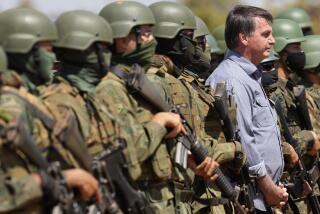Skeptics Await Nigerian Voting
- Share via
LAGOS, Nigeria — People here still sing and dance to “Soldier Come, Soldier Go,” a hard-hitting ditty by the late “king of Afrobeat,” Fela Kuti, about the military’s stranglehold on power in this West African nation.
As Nigeria holds its first civilian-run national elections in 20 years today, many voters say Fela’s song continues to resonate. Today’s balloting is for seats in parliament, but four of the top candidates in voting for president scheduled for next Saturday are former generals, including incumbent Olusegun Obasanjo. It is therefore not surprising that people here refer to politics as “militics” -- to emphasize the military’s lingering influence on the affairs of Africa’s most populous nation.
About 70 million of the country’s 129 million people are eligible to cast ballots in the legislative elections today. The results could foreshadow how Nigerians will vote when they return to the polls in a week to pick their president and governors for the country’s 36 states. Polls suggest that Obasanjo and his People’s Democratic Party will emerge as the winners.
Some Nigerians had hoped that Obasanjo would follow the example of former South African President Nelson Mandela and retire after a single term. But Obasanjo, a born-again Christian, says his supporters -- and the Almighty -- convinced him to seek another four years as head of state.
Obasanjo, a military head of state from 1976 to 1979, was largely backed by powerful generals in polls supervised by the military in 1999. His election, in which the generals allowed only three political parties to participate, ended 15 unbroken years of military rule.
Since then, Nigeria has remained nominally democratic. But many analysts blame Obasanjo for failing to tackle corruption, reduce unemployment -- especially among the nation’s youth -- and ease the ethnic and political tensions that have claimed more than 10,000 lives since his election.
This week, monitors from the Carter Center and the Washington-based National Democratic Institute warned that a wave of ethnic and political violence, especially in Nigeria’s oil-rich delta, threatened to mar this month’s polls.
The two groups said flaws in the planning of the elections could harm the public’s faith in the democratic process. Indeed, many Nigerians still didn’t know late Friday whether they would be able to vote today, as official ballots still had not been delivered to their polling places.
The U.S. election monitors also decried the lack of any apparatus to investigate vote buying, ballot-box stuffing and other abuses, despite what they said is the well-known corrosive influence of money in Nigerian politics.
The Nigerian government has assured monitors that the elections will be fair, however. It has promised to deploy about 250,000 officers to keep the peace during the polling period.
Many had expected this month’s elections to be smoother.
Three years ago, when President Clinton visited what he called the “new Nigeria,” he described political changes in the former military dictatorship as “the most important democratic transition in Africa” since the 1994 fall of apartheid in South Africa.
But analysts and many Nigerians say the nation’s political progress has been stifled by the Obasanjo administration’s inefficacy and the military’s continued dominance of politics. Corrupt military leaders used the huge wealth they accumulated during their long years in politics to establish patronage systems and co-opt civilian leaders.
Nosa Igiebor, editor in chief of Tell, the nation’s top-selling newsmagazine, says it will take time for the generals’ influence to dissipate. After all, Nigeria’s history since it achieved independence from Britain in 1960 has been fraught with military dictatorships -- except for Obasanjo’s election and a brief period of civilian rule between 1979 and 1983.
“With so many military men with more money than ideas, it was a certainty they would remain a dominant force in Nigerian politics,” Igiebor said. “Since they have more experience of ruling the country than the civilians, their influence will be felt for a long time.”
Obasanjo’s main opponent is Muhammadu Buhari, who served as military ruler for nearly two years ending in 1985. Polls suggest that Obasanjo will handily beat Buhari and the two other former generals: Ike Nwachukwu, a foreign minister under military strongman Ibrahim Babangida, and Emeka Ojukwu, who led the Ibo tribal secessionist movement in the 1967 Biafran war, which resulted in an estimated 1 million deaths.
More to Read
Sign up for Essential California
The most important California stories and recommendations in your inbox every morning.
You may occasionally receive promotional content from the Los Angeles Times.













